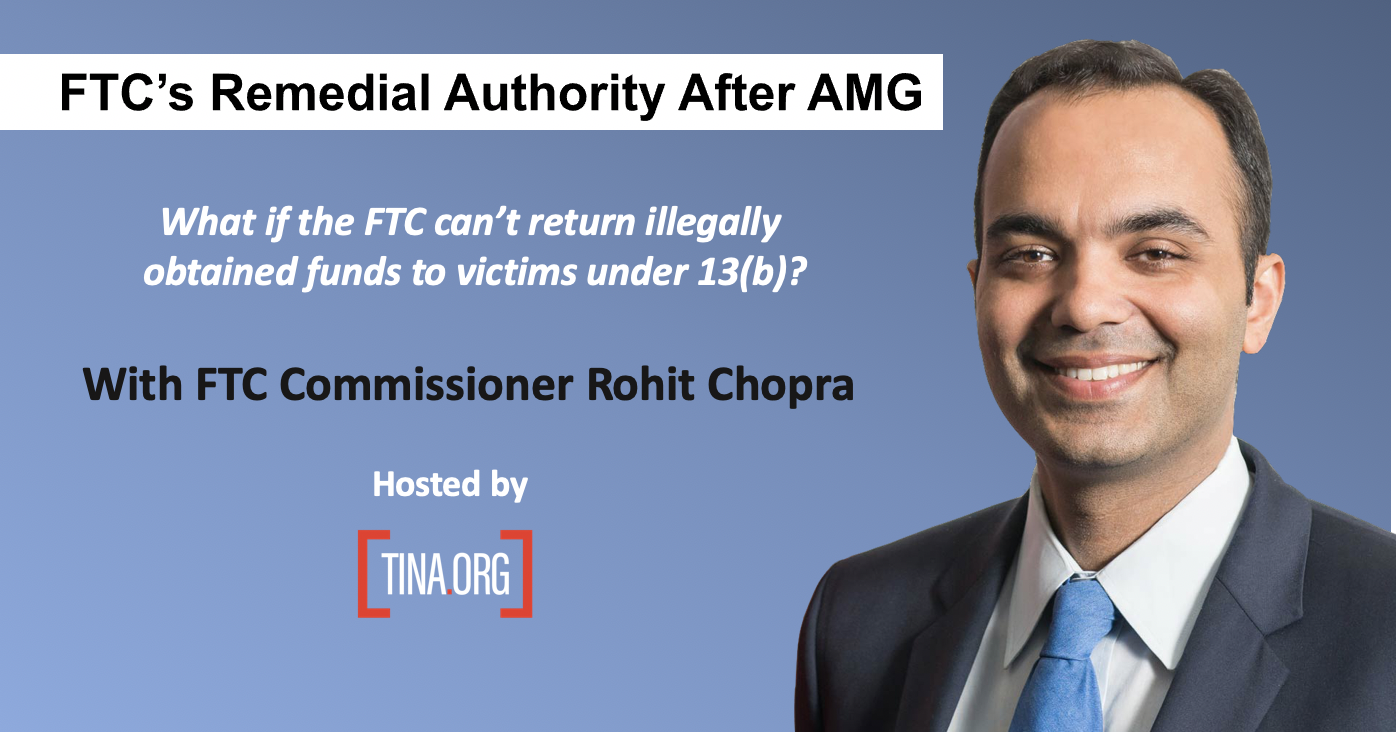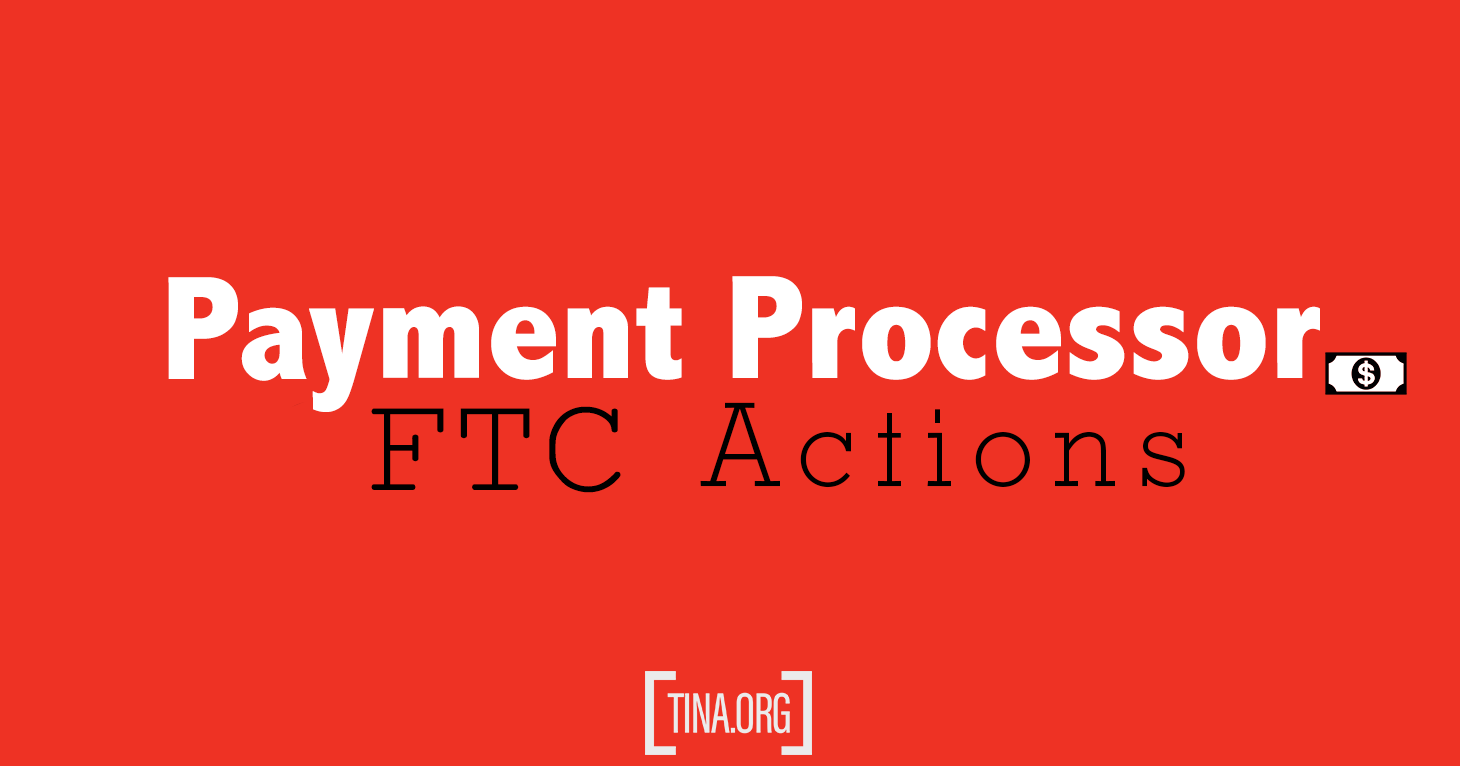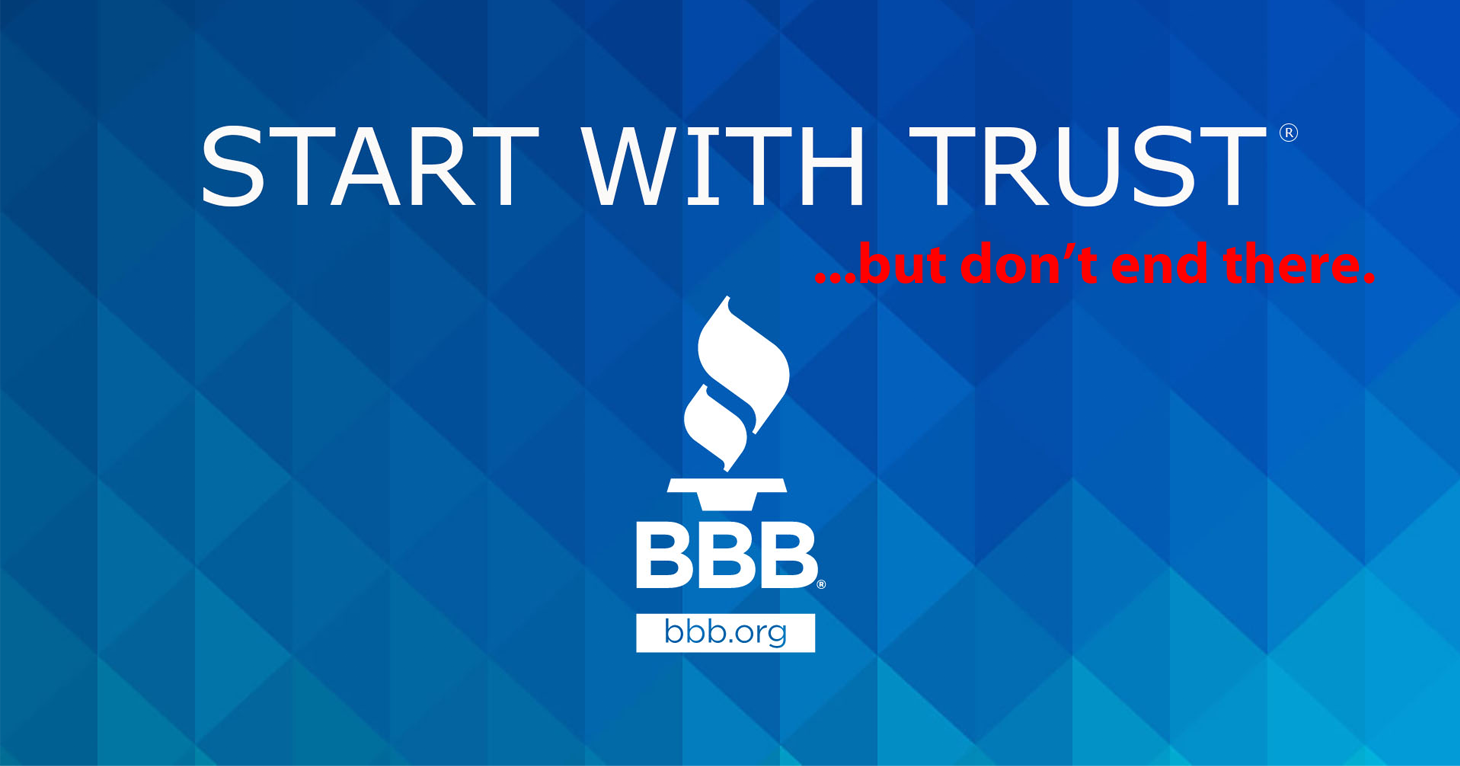
TINA.org Webinar: FTC’s Remedial Authority After AMG
In case you missed it, watch the webinar with FTC Commissioner Rohit Chopra.
A review of lawsuits the FTC has filed against companies and individuals that process credit and debit card transactions.
|
When customers swipe their credit cards at stores or submit their card information online to make purchases, payment processors help merchants get their money in a number of ways. It is the job of the payment processor to manage credit and debit card processing, communicate with banks and credit card companies, establish merchant accounts, distribute proceeds from sales to merchants and implement anti-fraud measures, among other things. However, the payment processor industry is not immune to fraud.
Since 2001, the FTC has brought 44 federal lawsuits and 1 administrative action against companies and individuals that process credit and debit card transactions. According to the lawsuits, the payment processors named in these cases have assisted fraudulent merchants take millions of dollars from consumers by helping merchants hide fraudulent conduct, ignoring signs of fraud and processing unauthorized payments. Some of the cases go after payment processors along with other companies and individuals as part of a larger scheme while other cases name only payment processors as defendants. Laws alleged to have been violated in these lawsuits include the FTC Act, the Telemarketing Sales Rule, the Restore Online Shoppers’ Confidence Act (ROSCA), the Electronic Transfer Fund Act and the Fair Debt Collections Practices Act, in addition to several state laws.
The FTC has described taking actions against payment processors as a “critical component of the FTC’s effort to fight fraud … while halting hundreds of millions of dollars of consumer injury.” According to the lawsuits, defendants in these cases have processed payments for pyramid schemes, deceptive negative option offers, fake free trials and other alleged scams. The payment processor defendants have also allegedly assisted fraudulent merchants, telemarketers, debt collectors and companies that have been the subject of previous FTC actions.
Payment processors have paid millions of dollars to resolve claims filed against them with all but two thus far resulting in some sort of monetary relief. Courts have also placed restrictions on payment processing in at least 36 cases, with some of the payment processors being banned from processing any and all payments, and others being banned from processing payments for certain types of businesses or transactions. And in at least 21 cases, courts have ordered payment processors to monitor and investigate their clients for fraudulent activity.
More information about the FTC actions against payment processors is below.
| Case Name
(Year) |
Payment Processor Defendant(s)[*] | Allegation(s) Relating to Payment Processing | Outcomes for Payment Processors |
|---|---|---|---|
| FTC v. Cordeiro d/b/a Quick-Checks
(2001) |
Quick-Checks | Processed payments for a telemarketer illegally selling foreign lottery tickets to U.S. residents. | Settled without monetary relief |
| FTC v. Electronic Financial Group
(2003) |
Electronic Financial Group, EFG Card Services and 3 officers | Processed payments for numerous deceptive telemarketing schemes, including at least 4 that were the subject of FTC actions. Defendants also promoted/processed payments for 2 fraudulent advance-fee debit card marketing scams. | Settled with monetary relief |
| FTC v. First American Payment Processing, et al.
(2003) |
First American Payment Processing, Check Processing Center, CET Corp. and several officers | Assisted fraudulent telemarketers by processing payments for advance-fee credit cards. (4 telemarketers were sued by the FTC and 2 were sued by New York.) | Settled with monetary relief |
| FTC v. Universal Processing, et al.
(2005) |
Universal Processing and 1 officer | Processed unauthorized debits from consumers’ checking accounts for Pharmacycards, a fraudulent discount prescription benefits program that made false representations. | Settled with monetary relief |
| FTC v. Global Marketing Group, et al.
(2006) |
More than two dozen companies and individuals | Provided payment processing services to at least 9 telemarketers that deceptively induced consumers with poor credit to pay an advance fee for a credit card they never received. | Summary judgment with monetary relief against 1 individual; 2 individuals settled with monetary relief; default judgments against 24 companies [√√] |
| FTC v. InterBill, et al.
(2006) |
InterBill and 1 officer | Processed payments for Pharmacycards, a telemarketer that sold fake prescription discount cards, and continued to process transactions after receiving complaints that consumers had not authorized payments. | Summary judgment with monetary relief against defendants [√] |
| FTC, et al. v. Your Money Access, et al.
(2007) |
Your Money Access, its subsidiary and 2 executives | Acted as a payment processor for hundreds of merchants marketing deceptive schemes — including credit repair, discount prescription benefits cards, and identity theft prevention services — and continued to debit consumers’ accounts despite signs payments had not been authorized. | Settled with monetary relief |
| FTC v. Willms, et al.
(2011) |
More than a dozen companies and individuals | Deceptively marketed products and services, including teeth whiteners, weight-loss products and work-at-home schemes. Also falsely represented costs and failed to adequately disclose recurring fees. | Settled with monetary relief [√√] |
| FTC v. Landmark Clearing
(2011) |
Landmark Clearing and 2 executives | Processed unauthorized debits from consumer bank accounts. | Settled with monetary relief |
| FTC v. Loewen, et al.
(2012) |
ReadyPay Services and Xavier Processing Services | Processed card payments for fraudulent telemarketers engaged in a car marketing scheme in which they falsely represented that for a fee they would put consumers who listed a vehicle for sale online in contact with potential buyers. | Summary judgment with monetary relief |
| FTC v. PCCare247 Inc., et al.
(2012) |
5 individuals | Processed transactions for computer repair products and services that were falsely marketed, including false claims that the operators were affiliated with well-known computer companies and that computers were infected with viruses and malware. | 2 defendants settled with monetary relief; default judgment with monetary and injunctive relief against 3 defendants |
| FTC v. Ambrosia Web Design d/b/a AWD, et al.
(2012) |
Several companies and individuals [**] | Engaged in a telemarketing scheme selling credit card interest rate reduction services, processed unauthorized credit card transactions, and failed to adequately disclose fees for services. | Settled with monetary relief [√√] |
| FTC v. WV Universal Management, et al.
(2012) |
Newtek Merchant Services and its president [†] | Provided payment processing services to TYS (a company offering credit card interest rate reduction services) even though there were indications that the company was engaged in fraud. | Summary judgment with monetary relief against 1 defendant; 1 defendant settled with monetary relief |
| FTC v. Innovative Wealth Builders, et al.
(2013) |
IRN Payment Systems [†] | Processed credit card charges for IWB while it was the subject of an investigation by the Florida attorney general and the FTC, and had received fraud alerts from credit card companies and consumer complaints that charges were unauthorized. | Settled with monetary relief |
| FTC v. The Tax Club, et al.
(2013) |
More than a dozen companies and individuals | Processed credit and debit card payments for The Tax Club Enterprise, a telemarketing scheme that used deceptive tactics to sell tax preparation and advice, business planning and counseling, and business credit development services. | 15 defendants settled (all but 1 with monetary relief); claims against 2 defendants were voluntarily dismissed [√√] |
| FTC v. Automated Electronic Checking, et al.
(2013) |
Automated Electronic Checking (AEC) and 2 executives | Played a critical role in the unlawful business practices of its clients by obtaining consumers’ financial account information and debiting unauthorized transactions from their accounts. | Settled with monetary relief |
| FTC v. Merchant Services Direct d/b/a Sphyra, et al.
(2013) |
Merchant Services Direct (MSD) d/b/a Sphyra and 1 officer | Deceptively marketed credit card payment processing services and equipment to small businesses by misleadingly offering them the “Guaranteed Lowest Rates” and wholesale rates when their rates were not the lowest or wholesale, and failed to properly disclose material information about the terms of the lease. | Settled with monetary relief |
| FTC v. Pinnacle Payment Services, et al.
(2013) |
More than two dozen companies and individuals | Defrauded consumers by processing payments for debts that consumers did not actually owe or that defendants did not have authority to collect. | 26 defendants settled with monetary relief; default judgment with permanent injunction and monetary judgment against 1 defendant [√√] |
| FTC v. Process America, et al.
(2014) |
Process America and 3 officers | Marketed fraudulent money-making opportunities resulting in more than $15 million in unauthorized charges to consumers’ credit and debit cards, and assisted merchants evade fraud-monitoring programs by opening multiple merchant accounts and submitting merchant applications containing false information, among other things. | 3 defendants settled without monetary relief; 1 defendant settled with monetary relief |
| FTC v. Apply Knowledge et al.
(2014) |
Purple Buffalo a/d/b/a Netmarketing and an owner | Facilitated the collection of payments for work-at-home kits and business coaching programs that were marketed using misleading and deceptive tactics. | Settled with monetary relief |
| FTC v. CardFlex, et al.
(2014) |
CardFlex and 2 high-level employees | Caused more than $26 million in unauthorized charges to consumers’ credit and debit cards by helping merchants maintain accounts that processed unlawful payments and evaded fraud-monitoring programs. | 2 defendants settled with monetary relief; 1 defendant settled without monetary relief |
| FTC v. PayBasics a/d/b/a Livewire Commerce, et al.
(2015) |
PayBasics and its co-founders | Among other things, assisted merchants – including the Tax Club, which was the subject of a legal action filed by the FTC, New York, and Florida – complete applications for accounts that would be used to process credit and debit card payments. | Settled with monetary relief |
| FTC, et al. v. E.M. Systems & Services
(2015) |
CardReady and several executives | Laundered consumer credit card payments for a debt relief scam that falsely promised a reduction in consumer credit card interest rates and charged consumers for debt relief never received. | Settled with monetary relief |
| FTC v. Capital Payments, LLC
(2016) |
Capital Payments, LLC [††] | Opened and maintained merchant accounts to process unlawful credit card payments for the Tax Club (a telemarketer that sold purported small business development services) despite warning signs that it was a deceptive telemarketing scheme. | Settled with monetary relief |
| FTC v. Lift International, LLC et al.
(2017) |
Processional Learning Institute and Future Education | Opened merchant accounts to process telemarketing sales of personalized business coaching services to consumers trying to start home-based Internet businesses. | Settled with monetary relief |
| FTC v. Thrive Learning, LLC et al.
(2017) |
Thrive Learning and its owners and managing members | Provided access to merchant accounts used to process transactions for a deceptive telemarketing scheme that sold personalized business coaching services to consumers trying to start home-based Internet businesses despite warning signs of deceptive and fraudulent sales practices. | Settled with monetary relief |
| FTC v. Electronic Payment Solutions of America, et al.
(2017) |
Electronic Payment Systems, Electronic Payment Transfer, its CEO, and 2 managers | Laundered credit card transactions for Money Now Funding, a business opportunity telemarketer sued by the FTC in 2013. | 1 defendant settled with monetary relief; claims against 4 defendants dismissed after they reached a settlement in a 2022 administrative action |
| FTC v. Hornbeam Special Situations, LLC et al.
(2017) |
iStream and its principals | Processed payments for memberships in discount clubs despite warning signs that payments had not been authorized. | Settled with monetary relief |
| FTC v. G2 Consulting, et al.
(2017) |
G2 Consulting and its owner | Opened fraudulent merchant accounts that enabled telemarketing operations engaged in deceptive practices to process consumer credit card payments. | Settled with monetary relief |
| FTC v. White
(2017) |
Jamie White | Fulfilled orders and processed payments for telemarketing schemes engaged in deceptive practices, including ones that solicited opportunities involving Amazon-linked websites. | Settled with monetary relief |
| FTC v. MOBE
(2018) |
Several MOBE companies, Transaction Management USA, and 1 individual | Processed consumers’ payments for a fraudulent business education program, “My Online Business Education,” that used false and unsubstantiated income claims and false and misleading refund and money-back guarantees in marketing materials. | 1 defendant settled with monetary relief; default judgments against 7 defendants |
| FTC v. Triangle Media Corp., et al.
(2018) |
An owner and officer of Triangle Media, Jasper Rain, Hardwire Interactive and Global Northern | Among other things, Defendants processed payments for skincare products, electronic cigarettes and dietary supplements marketed online using deceptive trial offers, inadequate disclosures and restrictive cancellation and refund policies. | Settled with monetary relief |
| FTC v. Apex Capital Group, et al.
(2018) |
SIA Transact Pro and its CEO [†] | Between 2015 and 2018, Latvian payment processing company helped process payments for Apex Capital Group, a dietary supplements and personal care products company that deceptively marketed “free” trial offers and enrolled consumers in continuity programs without consent. | Settled with monetary relief |
| FTC v. Allied Wallet, et al.
(2019) |
AlliedWallet, GTBill, and 3 executives | Assisted perpetrators of scams — including business opportunity scams, pyramid schemes and unlawful debt collection operations — charge consumers more than $110 million by submitting merchant applications with false information and working to evade monitoring measures designed to prevent fraud. | Settled with monetary relief |
| FTC, et al. v. Madera Merchant Services, et al.
(2019) |
Madera Merchant Services, B&P Enterprises, its owners and 1 officer | Routinely processed payments for perpetrators of fraud and deceptive schemes. At least 3 of the defendants’ clients were sued by the FTC and state attorneys general for consumer fraud and deception, including the credit card interest rate reduction telemarketing scheme Educare Center Services. | Settled with monetary relief |
| FTC v. RevenueWire d/b/a SafeCart, et al.
(2020) |
SafeCart and its CEO | Provided a variety of services — including payment processing services — to tech support scams, which advertised free computer diagnostic scans used to falsely identified performance and security problems to persuade consumers to purchase their software. | Settled with monetary relief |
| FTC v. First Data Merchant Services, et al.
(2020) |
First Data Merchant Services and its CEO | Opened merchant accounts and processed payments for at least 4 deceptive schemes that were the subject of FTC and DOJ enforcement actions, including 2 business opportunity scams, a debt relief telemarketing scam and a criminal enterprise that used stolen credit cards to bill customers. | Settled with monetary relief |
| FTC v. Qualpay
(2020) |
Qualpay | Processed payments for several companies that were sued by the FTC for defrauding consumers, including the business coaching and investment opportunity scheme “My Online Business Education” (MOBE) for which it processed nearly $80 million in payments despite warning signs the company was a scam. | Settled with monetary relief |
| FTC v. Complete Merchant Solutions, LLC et al.
(2020) |
Complete Merchant Solutions and its former Chief Executive Officer | Arranged for merchants engaged in fraud to open and maintain bank accounts used to process unlawful credit and debit card payments resulting in more than $93 million in charges to consumers. | Settled with monetary relief |
| FTC v. Moneta Management et al.
(2021) |
Moneta Management and its CEO and owner | Assisted companies – including a student loan debt relief scheme – obtain and maintain bank accounts that they used to process credit and debit payments. | Settled with monetary relief |
| FTC v. Automatic Funds Transfer Services, Inc. et al.
(2021) |
Automatic Funds Transfer Services and its president and owner | Debited at least $31 million dollars from consumers’ bank accounts on behalf of Student Loan Group, a fraudulent telemarketing scheme that sold bogus student loan debt relief services. | Settled with monetary relief |
| In the Matter of Electronic Payment Systems et al.[#]
(2022) |
Electronic Payment Systems, Electronic Payment Transfer, and two owners of the companies | Laundered credit card transactions for Money Now Funding, a business opportunity scam sued by the FTC in 2013. | Settled without monetary relief |
| FTC v. First American Payment Systems also d/b/a Merimac Capital et al.
(2022) |
First American Payment Systems also d/b/a Merimac Capital and two companies that operate solely as sales entities for the payment processor | Used deceptive tactics to convince small businesses to switch from their current payment processing provider, including misrepresenting that monthly fees would be lower than the ones actually charged, using flawed savings projections, and failing to disclose key details of the services agreement, including the autorenewal provision and cancellation requirements. | Settled with monetary relief |
| USA v. Nexway
(2023) |
Nexway companies and 2 officers | Processed payment for telemarketers that sell tech support services by making false statements about the performance and security of consumers’ computers | Settled with monetary relief |
| FTC v. BlueSnap, Inc. et al.
(2024) |
BlueSnap and 2 senior executives | Processed payments for deceptive and fraudulent merchants – including the debt relief telemarketing scam ACRO Services – despite warning signs that they were engaged in fraud. | Settled with monetary relief |
[*] There may be payment processor defendants not listed in this chart. Some of the complaints say that “defendants” engaged in payment processing without specifying which defendants.
[**] The payment processing allegations were added in an amended complaint.
[†] Payment processors were added as defendants in an amended complaint.
[††] The activities at issue in the complaint occurred between 2010 and 2013 when the defendant was Capital Payments, LLC. The defendant changed its name to Bluefin Payment Systems LLC in December 2014.
[√] Ten years later, the payment processor defendants settled charges that they violated the 2009 court order in this case. The agreement includes both monetary and injunctive relief.
[√√] There may be some defendants in this summary that are not payment processors. It includes all of the defendants because the complaint does not specify which ones are payment processors.
[#] This case is an administrative action.
In case you missed it, watch the webinar with FTC Commissioner Rohit Chopra.
Researching a company shouldn’t be one-stop shopping.
Odds are you being good at trivia is not enough if you want to pay off your student loan debt with this app.


